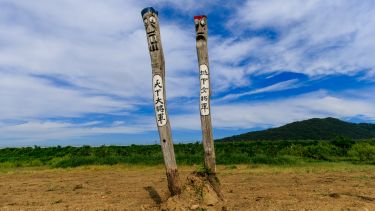1979! Who then in Britain had really heard of Korea? If anyone knew anything about South Korea it was seen as a poor, undeveloped country faced by a belligerent communist north.
Who would want to study about this country and learn its language? In that year, Sheffield came to be in the forefront of developing the study of Korea, past and present, in Europe.
Why Sheffield? Sheffield was a pioneer university in promoting the study of modern and contemporary East Asia. Its Centre for Japanese Studies - the precursor to the School of East Asian Studies, was the first in the UK and almost anywhere else to promote the study of modern Japan and the modern Japanese language, to focus on the social scientific study of Japan, and to do so through dual degrees.
No other university anywhere at the time did all of these things.
As a reflection of this dynamism, the director of the dual honours degree programme in Japanese and Linguistics, Dr Jiri Jalinek, thought that no student doing that degree programme should graduate without knowing the Korean language. So, he began the instruction of the Korean language and with it Korean Studies as a discipline began in Sheffield.
In 1980, this programme of Korean Studies was placed on a firm footing when the then Head of Department, Graham Healey, secured five-years funding from the Korean Traders’ Scholarship Foundation (Sanhak chedan) for a lecturer in Korean Studies (to which Dr Judith Cherry was the first appointee), and for a native-speaker lector in the Korean language.
From the early 1980s, Korean Studies was an established fact within the academic life of the University. The development of Korean Studies during the decade of the 1980s was furthered by two important developments - donations of large numbers of books on Korea to the University Library, and the signing of an exchange agreement with Yonsei University.
Donations of high-quality academic books came from several sources, but most notably two gifts of over 2,500 books from the Kyobo Bookstore, then the largest bookseller in Korea.
This gift included important historical documentary material such as the Tripitaka Koreanum (the largest collection of Buddhist scriptures in East Asia), the Chosŏn wangjo sillok (the official state records of every king of the Chosŏn dynasty), half of the Sŭngjŏng-wŏn ilgi (the Diary of the Royal Secretariat upon which the sillok were based), and the official records of the Government-General of Chōsen, the Japanese colonial government of Korea from 1910 to 1945.
This collection of materials alone constitutes one of the largest collections of historical documentary material in all but the most specialised libraries.
By the beginning of the 1990s, these materials had been augmented by national and provincial (especially the Southeast) statistical and documentary materials from post-Korean War South Korea, along with significant holdings of materials in language and linguistics, literature, art, music, and folklore.
By the middle of the 1990s, the Sheffield Korean Collection was the third largest collection of Korea-related academic materials in Europe, making it a major resource for a range of researchers. This fact was driven home to me around that time when a Canadian researcher told me that a particular book he needed was held only at Yale and Sheffield.
The signing of an exchange agreement in 1986 with Yonsei University, one of the ‘Big Three’ prestige universities in Korea, had two important effects.
First of all, the agreement helped to augment and stabilise the teaching of the Korean language through a formal relationship with the Korean Language Institute (Han’gugŏ haktang), the oldest institute for the formal teaching of the Korean language in Korea.
As part of the agreement each year the Institute sent experienced language teachers to oversee the teaching of the language, beginning in 1988 with Mrs Hong Kyŏngp’yo, the most senior Korean language teacher in Korea.
Building on the existing solid foundations established in the early years of the 1980s under Dr Judith Cherry, Mrs Hong created a precedent for the highly intensive language instruction of today.
The exchange agreement with Yonsei also permitted the creation of a full four-year degree programme in Korean Studies because it was possible to send degree-candidate students for a full year to the KLI.
Upon return from the experience of learning Korean in Korea, the students were then equipped for the next two years of reading sophisticated materials, learning Chinese characters as used in Korean, and speaking on a complex subject.
The current programme of language tuition at Sheffield produces a graduate whose knowledge of modern Korean is unrivalled by any university in Europe or North America.
Following the creation of four-year single honours and dual honours degrees from 1994, the Korean Studies programme could offer students a comprehensive background to modern and contemporary Korea with modules in traditional culture, contemporary society, modern literature, pre-modern and modern history, politics, economics and business.
With optional modules in the department, there was also instruction in East Asian cinema and Buddhist and Confucian philosophy.
This undergraduate programme of Korean Studies including the intensive study of the language provided a well-rounded background for graduates going into a number of fields in business, diplomacy, and other fields, as well as providing a foundation for taught and research postgraduate programmes.
In the past year and this coming year, new lecturers have been appointed including those in celebration of the fortieth anniversary of Korean Studies at Sheffield.
It is my hope that the department looking forward for the next four decades will continue to look to build and support a broad-based programme of study which will provide graduates with a solid understanding of the historical, cultural and social background to contemporary Korea.
Written by Emeritus Professor James H. Grayson.

